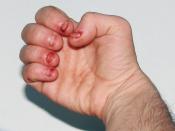OUTLINE
Holden, Charlie, and Devon:
An Analysis of the Psychological Disorders in Three Characters
To truly understand the characters (as well as their thoughts and actions) in The Catcher in the Rye, The Perks of Being a Wallflower, and Not as Crazy as I Seem, it is necessary to understand the psychological disorders that they deal with, such as manic-depressive disorder, obsessive--compulsive disorder, Post-traumatic Stress disorder, and others.
A. Introduction
B. Holden
1. About MDD/Schizophrenia
I. Symptoms
II. Causes
2. Holden and MDD
I. Tendencies
a. Feeling that everyone is "phony"
b. Suicidal thoughts
II. Examples found in text
3. Holden and Schizophrenia
I. Tendencies/symptoms
II. Examples found in text
C. Charlie
1. About GAD/PTSS
I. Symptoms
II. Causes
2. Charlie and GAD
I. Tendencies/symptoms
a. Social anxieties
b. Personal anxieties
II. Examples found in text
3. Charlie and PTSS
I. Tendencies
II. Examples found in text
III. Charlie's cause
D. Devon
1. About OCD
I. Symptoms
II. Causes
2. Devon and OCD
I. Tendencies
II. Examples found in text
III. Devon's cause
E. Conclusion
PAPER
Holden, Charlie, and Devon:
An Analysis of the Psychological Disorders in Three Characters.
The characters in The Catcher in the Rye, Not as Crazy as I Seem, and The Perks of Being a Wallflower may seem completely different, but they are alike in many ways. Holden, Charlie, and Devon are three boys from three different decades, cities, and families, but there is one thing that ties them together. All three of them have psychological disorders. To truly understand the characters (as well as their thoughts and actions) in The Catcher in the Rye, The Perks of Being a Wallflower, and Not as Crazy as I Seem, it is necessary to understand the psychological disorders that they deal with, such as manic-depressive disorder, obsessive--compulsive disorder,


